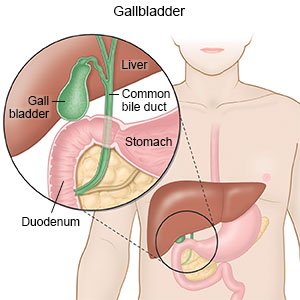Gallbladder Ejection Fraction
Medically reviewed by Drugs.com. Last updated on Apr 6, 2025.
What do I need to know about gallbladder ejection fraction (GBEF)?
GBEF measures how much bile your gallbladder releases at one time. Bile helps your body digest fat. When you eat fat, your gallbladder releases bile into your bile duct. A GBEF is usually measured during a test called a hepatobiliary iminodiacetic acid (HIDA) scan.
 |
Why does my healthcare provider need to measure GBEF?
You may need your GBEF measured to check for problems with your gallbladder. Examples include an infection, swelling, or a blockage. Symptoms of gallbladder problems include the following:
- Lump on the right side of your abdomen
- Decreased appetite or weight loss
- Fever or chills
- Nausea or vomiting
- Yellowing of your skin and the whites of your eyes
How do I prepare for the test that measures GBEF?
Your healthcare provider will talk to you about how to prepare for the test. He or she may tell you not to eat or drink anything for 4 hours before the test. Tell your provider about all the medicines you take. You may need to stop taking certain medicines before the test. Tell your provider if you are pregnant or breastfeeding. Medical shields can be used to protect your baby.
Drugs used to treat this and similar conditions
Ancef
Ancef is used for bacterial endocarditis prevention, bacterial infection, bone infection ...
Dilaudid
Dilaudid (hydromorphone) is a narcotic pain reliever used to treat moderate to severe pain ...
Omvoh
Omvoh is used to treat moderate to severe ulcerative colitis or Crohn's disease in adults. This ...
Qutenza
Qutenza patches are used to treat neuropathic pain associated with postherpetic neuralgia and ...
Actigall
Actigall is used for gallbladder disease, primary biliary cholangitis
Paracetamol
Paracetamol (Panadol, Calpol, Alvedon) is a widely used over-the-counter painkiller and fever ...
Cefazolin
Cefazolin systemic is used for bacterial endocarditis prevention, bacterial infection, bone ...
Acetaminophen/hydrocodone
The combination of hydrocodone and acetaminophen is used to relieve moderate to severe pain ...
Hydrocodone
Hydrocodone (Hysingla ER and Zohydro ER) is used for around-the-clock treatment of severe pain ...
What will happen during the test?
A radioactive substance called a tracer will be injected into a vein, usually in your hand or arm. A provider will position a camera above your stomach. He or she will take pictures every 5 to 15 minutes for 1 to 2 hours. After these pictures are taken, you will be given medicine to make your gallbladder release bile. The medicine may cause nausea or abdominal pain. These symptoms should get better in a few minutes. More pictures will be taken as your gallbladder releases bile.
What will happen after the test?
More scans may be taken 24 hours after you have received the tracer. Your provider will tell you when to return if more scans are needed.
What are the risks of the test?
You may have an allergic reaction to the tracer.
Care Agreement
You have the right to help plan your care. Learn about your health condition and how it may be treated. Discuss treatment options with your healthcare providers to decide what care you want to receive. You always have the right to refuse treatment. The above information is an educational aid only. It is not intended as medical advice for individual conditions or treatments. Talk to your doctor, nurse or pharmacist before following any medical regimen to see if it is safe and effective for you.© Copyright Merative 2025 Information is for End User's use only and may not be sold, redistributed or otherwise used for commercial purposes.
Further information
Always consult your healthcare provider to ensure the information displayed on this page applies to your personal circumstances.
